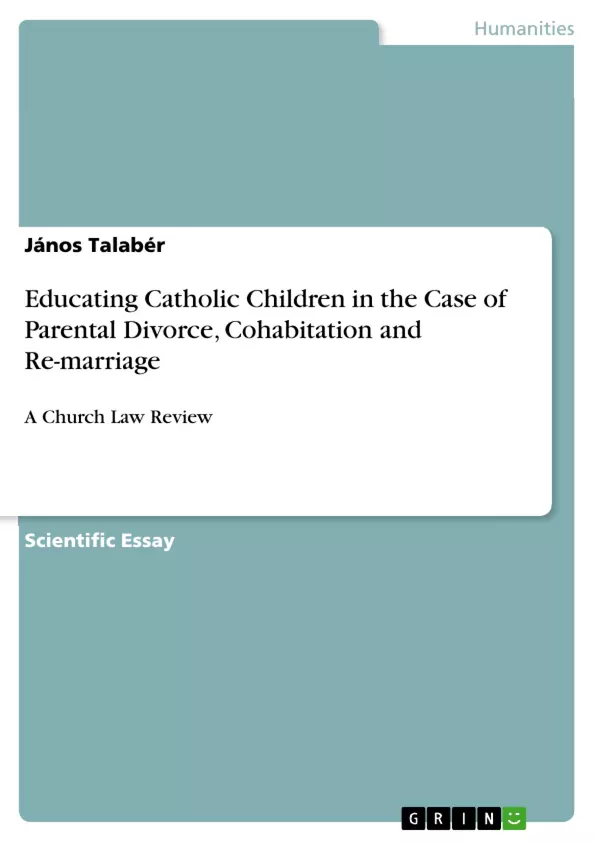In the aspect of the Council and the new code, the parental rights had been settled and it seemed to be absolutely clear what these rights and obligations had been. However, as this essay would like to show, there remained many questions opened. The major thing that kept us puzzle through our previous doctoral research as well was that how parental rights and duties can be exercised if the parents get divorced, or there is a partner of life (cohabitation) and also when one or both parents remarry. In these cases, the duties and the rights must be handled more precisely. We do think that the Code does not count on these in every detail. The problem might be that the CIC itself would not account for civil divorce and re-marriage. It only speaks about “legal” separation. However, in the case of a successful nullity case and positive decision, we must account for remarriage, or partnership where the duties and right must also be exercised, and the children must get the proper education.
Inhaltsverzeichnis (Table of Contents)
- Introduction
- Participants in education process
- Parents as primary educators
- Role of godparents
Zielsetzung und Themenschwerpunkte (Objectives and Key Themes)
This essay examines the application of Canon Law regarding the education of Catholic children in the context of parental divorce, cohabitation, and remarriage. It investigates how parental rights and duties, as defined in the Code of Canon Law (CIC), are exercised in these complex family structures.
- Parental rights and duties in Catholic education
- The role of the Church in guiding Catholic education
- The challenges posed by family structures resulting from divorce, cohabitation, and remarriage
- The adequacy of the CIC in addressing modern family dynamics
- The practical application of Canon Law in non-traditional family situations
Zusammenfassung der Kapitel (Chapter Summaries)
The introduction discusses the historical context of the Code of Canon Law's approach to Catholic education, highlighting the influence of Vatican II and the documents Gravissimum Educationis and Dignitas humanae. It establishes the central question of how parental rights and responsibilities in education are navigated in cases of divorce, cohabitation, and remarriage, areas where the Code may lack specific guidance.
The section on "Participants in education process" focuses on the roles of parents and godparents. It emphasizes the primary role of parents as the first educators and discusses the expectations and limitations associated with the role of godparents in Catholic upbringing.
Schlüsselwörter (Keywords)
Catholic education, Canon Law, parental rights and duties, divorce, cohabitation, remarriage, Vatican II, Gravissimum Educationis, Dignitas humanae, family structures, godparents.
Frequently Asked Questions
How does Canon Law view parental rights in education?
Parents are considered the primary educators of their children, with specific rights and obligations defined by the Code of Canon Law (CIC).
What challenges arise for Catholic education in cases of divorce?
The CIC mainly speaks of "legal separation" and may not account for the complexities of civil divorce and subsequent non-traditional family structures.
What is the role of godparents in the education process?
Godparents are expected to assist parents in the Catholic upbringing of the child, though their role has specific expectations and limitations.
Does the Church provide guidance for remarried parents?
The study investigates how parental duties should be handled more precisely in cases of remarriage or cohabitation to ensure proper Catholic education.
Which Church documents influenced this essay?
The essay draws on Vatican II documents such as "Gravissimum Educationis" and "Dignitas humanae".
- Citation du texte
- János Talabér (Auteur), 2012, Educating Catholic Children in the Case of Parental Divorce, Cohabitation and Re-marriage, Munich, GRIN Verlag, https://www.grin.com/document/187095



